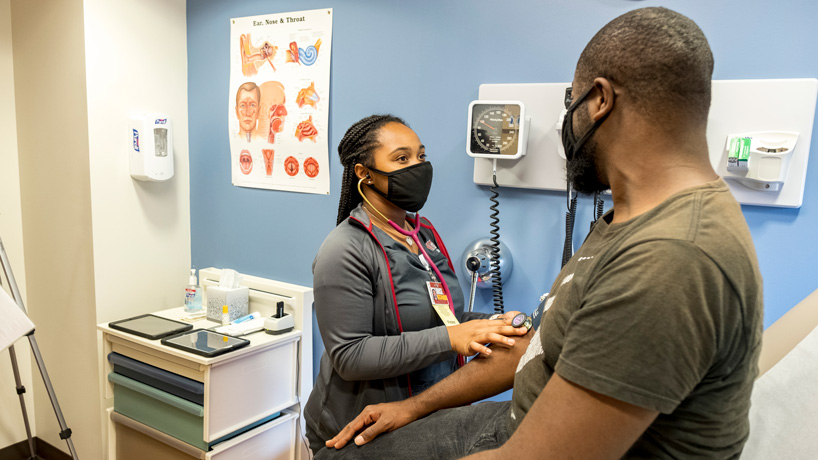The University of Missouri–St. Louis College of Nursing has an important role to play in helping alleviate the nursing shortage in St. Louis by equipping students with the skills they need to serve patients in hospitals, clinics and physician’s offices.
It also shares a commitment with the wider university to develop a diverse workforce across the region.
A new articulation agreement between UMSL and Lewis and Clark Community College’s East St. Louis Higher Education Center in Illinois serves both goals by providing support for 15-20 underrepresented minority students each year as they begin pursuing their Bachelor of Science in Nursing degrees through the newly created Bridge to BSN program.
“The field of nursing lacks representation in some areas,” said Justine Patterson, an academic advisor in the College of Nursing who has been involved in establishing the partnership. “This is a great opportunity to help change that by expanding our network and allowing these students a smoother path to a career in the field. I think it’s going to be great for the field of nursing and the overall St. Louis community.”
LaVeasey Carter, Lewis and Clark’s assistant director of academic affairs at the Higher Education Center, was the first to recognize the need for this type of agreement and act on it. He noticed there were already pathways for students to become certified nursing assistants or licensed practical nurses through Southwestern Illinois College, which also operates a satellite office at the center. But nothing existed to help students who wanted to pursue a BSN.
“That piece seemed to be missing, so I was thinking of ways in which we could really be intentional and provide that opportunity to students in the area,” Carter said.
He knew Patterson from their time together at another institution, and the two of them began the dialogue that led to the eventual agreement between UMSL and Lewis and Clark.
Carter said UMSL has proved to be an ideal partner because of the cooperation and flexibility the College of Nursing provided in mapping out an academic plan for students preparing to transfer to the university. UMSL also offers in-state tuition, had support systems in place to help ensure student success and had a location along MetroLink’s red line that made it accessible to students needing transportation from the other side of the Mississippi River.
Under the terms of the agreement, Lewis and Clark is creating the Bridge to BSN program and will ensure that students successfully complete early math and English classes, so they have a stronger foundation when they begin work at UMSL.
The university will assist the Bridge to BSN students with the application process to UMSL and, upon their admission, will give them each a renewable $1,000 Community Partnership Scholarship, provided they maintain at least a 2.5 GPA.
UMSL will also provide each student a coach from Multicultural Student Services, and the students will also have access to tutoring, professional development workshops and other academic support through Student Academic Support Services.
“We’re going to do our best to make sure that they have everything they need to be successful, particularly in their science and math courses, once they come to UMSL,” Patterson said.
Stephanie Tate-Patterson, a nurse practitioner and the CNA program coordinator for East St. Louis School District 189, is excited about the agreement and the opportunities it will provide to students she works with.
“It levels the playing field for minorities who are underrepresented in professional health care fields such as nursing,” Tate-Patterson said. “The coaching that is implemented in the curriculum is imperative for increasing the success of these students. Far too often students spend excessive years trying to complete pre-requisite classes necessary to apply for nursing programs and give up or change majors.
“Allowing the students to begin the program in their own community for the first year gives them a sense of belonging and security.”















